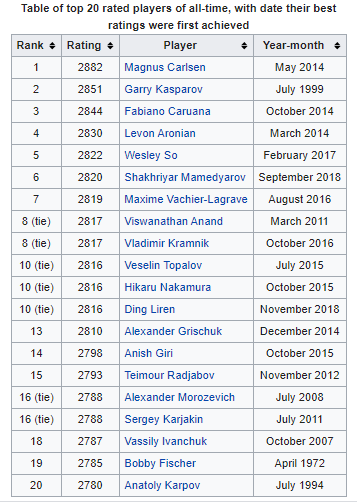I think they certainly have increased their ELO, but more importantly, their overall chess strength. ELO is only a rating relative to others in the pool so it may tend to go up more slowly if everyone in the pool gets better, which they have collectively.
First, you need to take an average of the top players, rather than look at just two incredibly special players, Kasparov, and Carlsen, and their peak ratings. Fischer was a total anomaly for his time, and again, you cannot base a lot on one person. Humans probably have a limit mentally much the way runners will eventually hit a speed wall that they cannot break. It is the Bell Curve in action: Easy to make progress in the middle, but harder on the end.
ChessBase, and the first strong engine, KnightStalker (aka Fritz 1.0, renamed at version 2.0) came out in 1990, and the Internet was still in its infancy. In January of 1990, there were only two players over 2700, Karpov at 2730, and Kasparov at 2800. Today, there are 37 players over 2700, and of those, three are over 2800.
I have been playing for a long time, and anyone, who knows my handle, has seen me watching relays of the top tournaments on ICC for more than 20 years, and I can say that it is not just inflation from having actually watched the level of play improve over the years. Players at the Master-level, including even normal Masters, are MUCH better now due to the tools available today than the tools available when I first became a Master.
When I first started playing, all we had was books, and a local club. Today, I can logon virtually any day, and play a GM. I was also a ranked tennis player as a teenager, and I can tell you from that experience, playing better competition makes you better, so being able to logon and play stronger players than ever has increased the overall level of play. In addition, we now have ChessBase, and a database of about 8.3M games that can be sorted efficiently and studied. We also have engines, as noted in the question, and they certainly have also added to our chess knowledge, and fundamentally changed how the top players prepare. Lastly, I mentioned books, and as an avid collector (I had 1800 at my peak), I can tell you that even the quality of the material in books is on another level since when I started.
I cannot tell you what proportion of all these advances have played toward X-number of rating points increase, but I can tell you that without a doubt, they all have lead to players at the top levels, and even down some, being much better overall.

